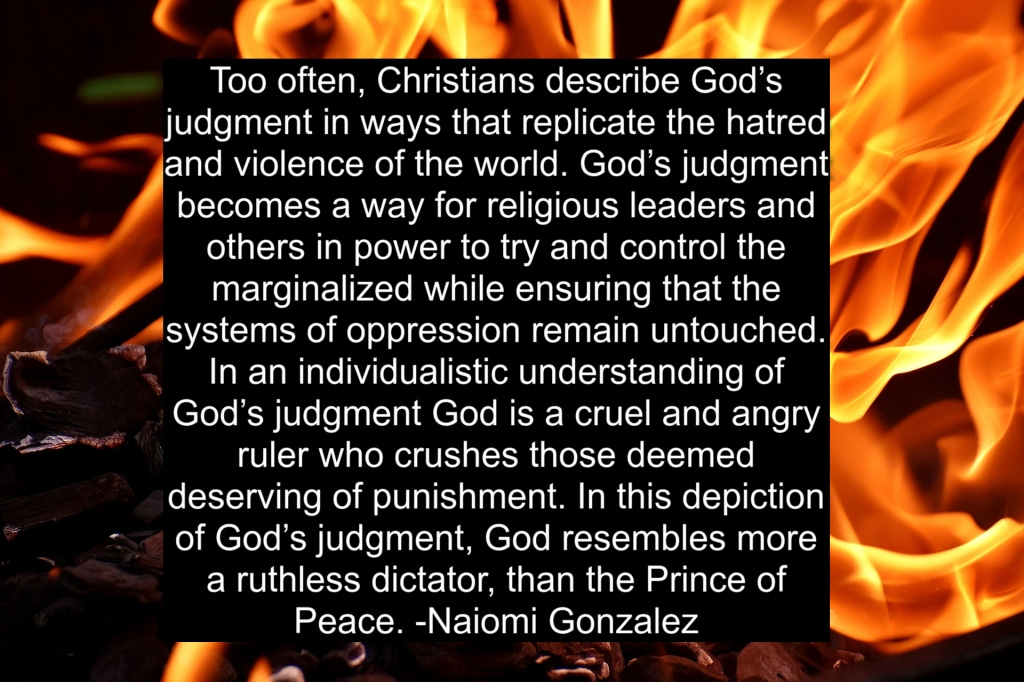Second Sunday of Advent: Peace and Judgment
Comfort, O comfort my people,
says your God.
Speak tenderly to Jerusalem,
and cry to her
that she has served her term,
that her penalty is paid,
that she has received from the LORD’s hand
double for all her sins.
A voice cries out:
“In the wilderness prepare the way of the LORD,
make straight in the desert a highway for our God.
Every valley shall be lifted up,
and every mountain and hill be made low;
the uneven ground shall become level,
and the rough places a plain.
Then the glory of the LORD shall be revealed,
and all people shall see it together,
for the mouth of the LORD has spoken.” -Isaiah 40:1-5 NRSV
What do you think of when you hear the phrase, “God’s judgment?” You may have images that reflect God’s wrath and violence. You may imagine being tormented in a lake of fire for all eternity and separation from God. Now what do you think of when you hear the phrase, “God’s peace?” Most likely you think of God’s love and God’s eternal presence. In this scenario, which emphasizes the individual nature of both God’s peace and God’s judgment, peace and judgment are incompatible concepts. They are separate and distinct. An individual who pleases God with their good behavior and theologically sound beliefs will be blessed with God’s peace, while those who displease God and have suspect beliefs, face God’s divine wrath and judgment.
But what if we understood God’s peace as entwined with God’s judgment? How would our understanding of peace and judgment change if we examined them through a communal lens, rather than an individualistic one?
The Bible, as a complicated book, presents multiple images of peace and judgment. Certainly, there are verses that present the two concepts as distinctly separate. And yes, there certainly are stories and verses that describe God’s judgment as violent and as something to be avoided. But there are also passages that insist that God’s judgment will usher in a new world where war and oppression are no more. The poor will no longer be abused and exploited for the benefit of the rich. Hatred will have no place in this new world. Diseases that kill hundreds of thousands of people, mostly the poor and marginalized, will no longer exist. This understanding of judgment focuses on the idea that God’s judgment is meant to rescue and save humanity, not punish us. God’s judgment is one of liberation and justice.
Too often, Christians describe God’s judgment in ways that replicate the hatred and violence of the world. God’s judgment becomes a way for religious leaders and others in power to try and control the marginalized while ensuring that the systems of oppression remain untouched. In an individualistic understanding of God’s judgment, God is a cruel and angry ruler who crushes those deemed deserving of punishment. In this depiction of God’s judgment, God resembles more a ruthless dictator, than the Prince of Peace.
But communal descriptions of God’s judgment present peace as the end result. In this scenario God’s judgment is less about punishing individual bad actors but about eradicating the very systems that allows these bad actors to gain power in the first place. Peace is not about an individual getting on God’s good side but peace, true peace, will arrive when all of God’s children do not need to stay up at night worried about whether they can afford to both feed their kids and keep a roof over their heads while working three jobs. True peace looks like Black and brown people being able to go to the store, hang out with their kids, play with toys without being afraid that one fateful interaction with state agents will lead to their deaths. True peace looks like people of all ages, skin colors, physical and mental abilities, sexual orientations, and gender identities being treated with dignity and respect simply for existing.
True peace, however, first requires God’s judgment of the present world. Not in a, “oh my gosh, we are all going to burn in hell” kind of way. But in a, “these old systems that have propped up the world for thousands of years, do not work and they need to be destroyed.”
Advent is a time of peace. We hope and pray for God’s peace to come over the world. But advent is also a time of judgment. Scripture tells us that God looked at the world, saw the massive amount of suffering and injustice and decided that the only way to bring liberation and freedom would be to join us.
God’s judgement and God’s peace have always been linked. We cannot have one without the other.



